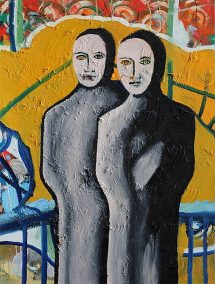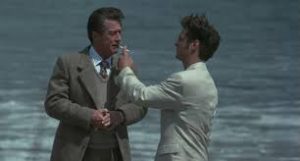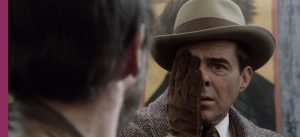The Double (Jose Saramago)

Painting by Sebastian Bieniek
(English translation: 2004)
Secondary-school history teacher Tertuliano Maximo Afonso (almost always referred to by his full name) is depressed and apathetic. He cares little about his work (believing that history should be taught in reverse not forward), neglects his mother, can’t remember what led him to get married, forgets why he got divorced and is trying to dump his girlfriend, Maria da Paz (also almost always named in full). He lives alone and spends most of his free time listlessly plodding through a large tome on Abyssinian history. His only friend, a fellow teacher, suggests that he is out of sorts: I have been feeling a bit low, Health problems, No, I’m not ill as far as I know, it’s just that everything tires me and bores me, the wretched routine, the repetitiveness, the sense of marking time.
The dialogue is all like this – no quotation marks or dashes are used. The reader must pay attention to work-out who is speaking. The effect, together with that of Saramago’s long, looping, orotund sentences, drag the reader along on a kind of dull and pointless trek, rather like Tertuliano Maximo Alfonso’s life. At his almost-friend’s suggestion, Afonso hires a video. The video store assistant sneers at him, in particular at his outdated name. The film (The Race is to the Swift) is a second-rate comedy. Tertuliano Maximo Afonso becomes obsessed with the actor playing a minor character. Does this all sound familiar? Yes indeed, Tertuliano Maximo Afonso has a double – Giles De’Ath from the marvellous film Love and Death on Long Island (1997, director Richard Kwietniowski)*.
Unlike Dr De’Ath, Tertuliano Maximo Afonso is not fascinated by the actor’s beauty. Rather, he is knocked for a hoop by the actor’s perfect physical and vocal resemblance to himself. At this point we are reminded of Hermann Hermann in Nabokov’s Despair (and, again, a superb 1978 film adaptation by Rainer Werner Fassbinder).
The jacket blurb on our 2005 Mariner edition (translator Margaret Jull Costa) says, irritatingly, that Tertuliano Maximo Afonso is awoken by the VCR replaying the video. This erroneous, supernatural suggestion jars with the tone of the book, which is affectless, bearing a lassitude sometimes suggestive of mental illness.
Tertuliano Maximo Afonso plods off in search of his actor double. Each of them finds the idea of a twin abhorrent and unendurable, particularly the possibility that one is the ‘original’ and the other the ‘copy’. Each is horrified by the prospect of being seen with the other. Their loathing and suspicion compound. The plot, although tortured and peculiar, is consistent with the characters’ circumstances until a point at which it goes off its double rails – rather as if Saramago ran-out of ideas, resorting to sensationalism and leaving plot holes that a double-decker bus could be driven through. The very end does redeem the book somewhat, but by then it is too late.
Saramago’s exploration of identity, self-perception and delusion make this a worthwhile work, but I’d prefer to stick to the originals.
[*We at TVC must admit to not having – yet – read the source material for Love and Death…, i.e., the book of the same name, by Gilbert Adair.]Leave a comment...
While your email address is required to post a comment, it will NOT be published.




2 Comments